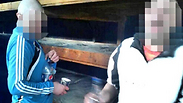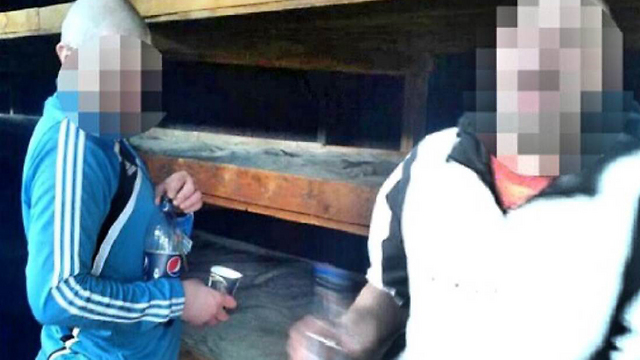
Polish men party in concentration camp
Three men in their 30s sneak into Majdanek to drink, sleep on prisoners' wooden bunks and take pictures for Facebook.
Three Polish men held a party at the Majdanek concentration and extermination camp last Saturday and posted the photos on Facebook.
The three men with shaved heads in their thirties snuck into the concentration camp by the city of Lublin in Poland, where the Nazis murdered some 200,000 people, including 80,000 Jews.
They took photos while drinking heavily beside the sleeping boards where the camp's inmates used to sleep.

The three entered one of the huts, pulled out bottles of alcohol and soft drinks, and ate potato chips while resting on the bunks.
The photos show two of the men joyfully smoking while in the background loom the crowded booths in which the starving and exhausted prisoners were held before they were sent to the gas chambers and crematoria.
Related stories:
- Technical issues leave MKs grounded in Poland
- Anne Frank house recreated in Argentina
- Germany chancellor visits former Nazi camp Dachau
The men uploaded their photos to Facebook, but attentive Polish Internet users reported the pictures to the Israeli organization Mi'ma'amakim (from the depths), that turned to the Polish police asking to remove the photos.
After the photos were taken down, the men were prosecuted and fined.
"The young men claimed they were not neo-Nazis or anti-Semites. They explained that they were not aware of the severity of their acts, that they did not understand how offensive their acts were," Mi'ma'amakim chairman, Johnny Daniels, said.
"We are cooperating with the Polish authorities to prepare educational shows for Polish anti-Semites so they may understand the history," he added.
Dr. Florence Eisenberg of Safed College conducted a study during which she visited 13 concentration camps, cemeteries, and memorial sites in Poland, Germany, Czech Republic, and Ukraine.
Eisenberg and her research partner, Dr. Anne Hansen, discovered that the majority of camps and cemeteries which they visited were not adequately maintained and are in a state of continued neglect.
"Israel must take an important role in maintaining these sites, which will eventually become the only lasting evidence to what really happened during the Holocaust," said Dr. Eisenberg.










